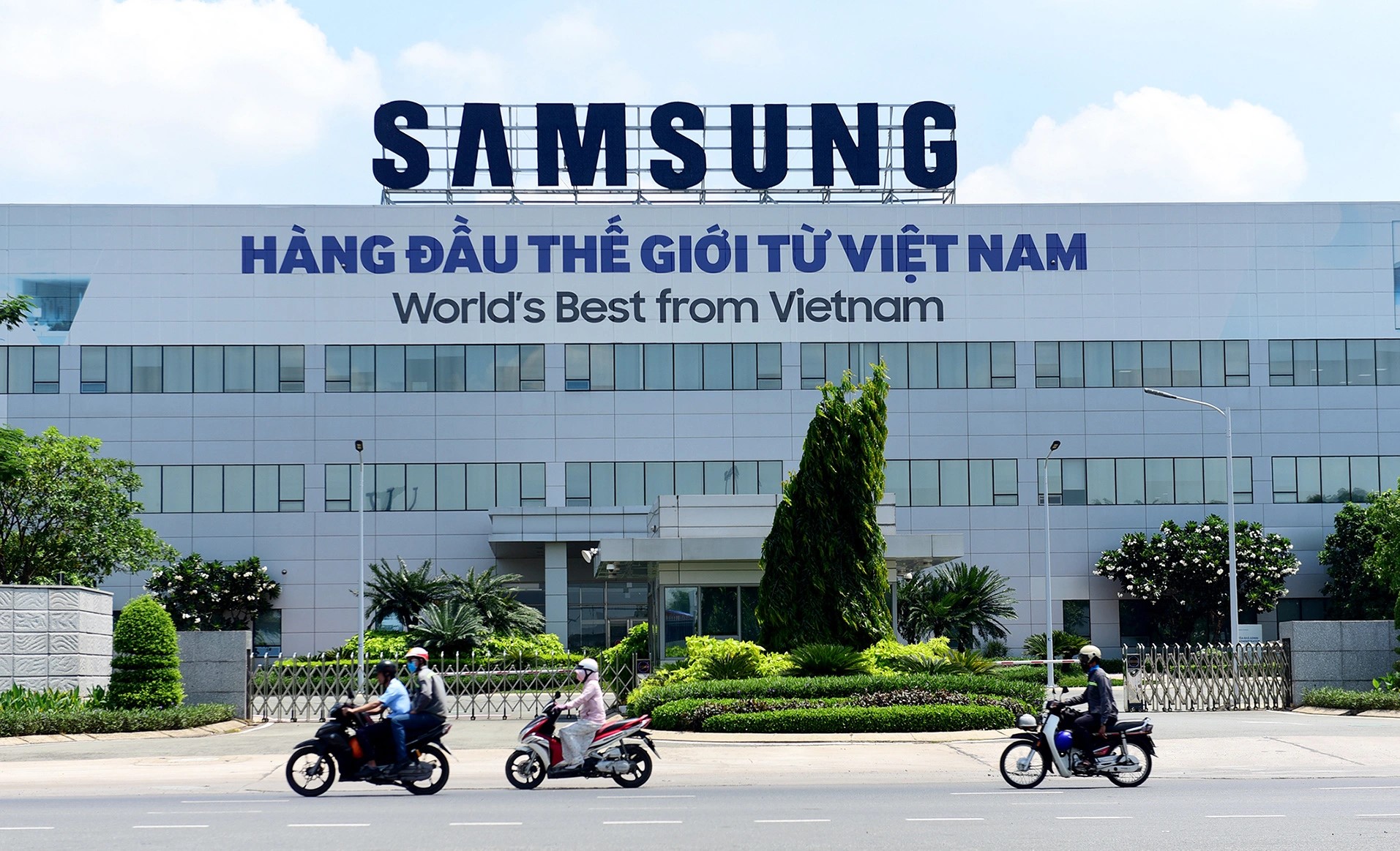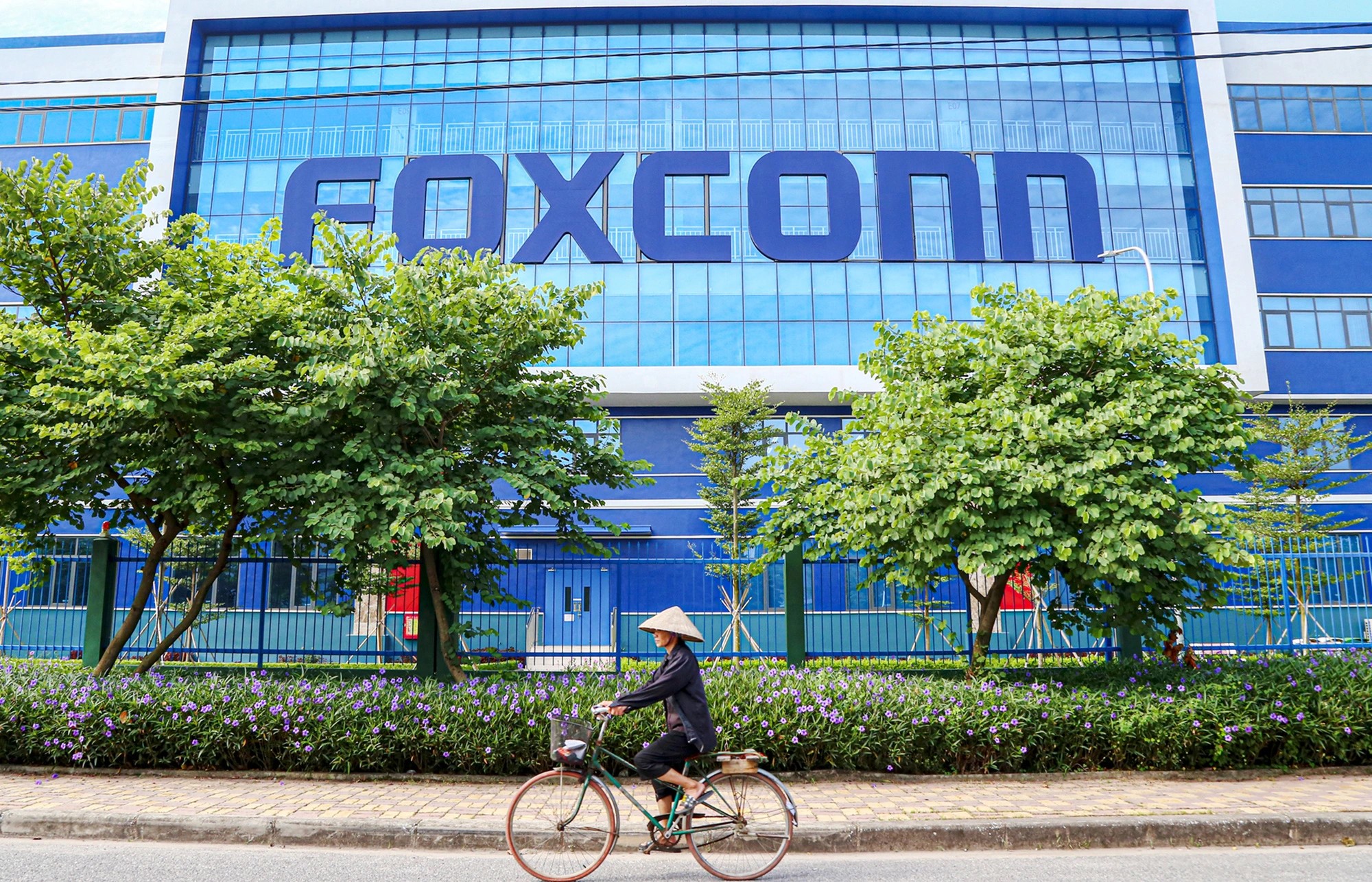Facing stiff competition to attract tech giants, Vietnam's Prime Minister has instructed government agencies to develop creative solutions to convince major companies like Intel, Foxconn, and Samsung, which already have significant investments in the Southeast Asian country, to stay on board.
Tuoi Tre (Youth) newspaper's conversation with an expert shed light on recommendations for the government, spanning short-term and long-term objectives to retain and attract major players in the tech industry.
Nguyen Van Toan, vice-chairman of the Vietnam Association of Foreign-Invested Enterprises, proposed that the central government not only improve the investment environment but also devise strategies to offset the impact of the global minimum tax (GMT) for investors.
This, he suggested, is essential not only for retaining existing technology groups but also for enticing new companies in the future.
Global technology groups play a pivotal role in leveraging Vietnam's human resources and rare-earth reserves, fostering the gradual development of the local semiconductor industry over the coming years, Toan remarked.
The GMT, a regulation imposing a 15-percent effective minimum tax rate on all multinational enterprises with revenues exceeding €750 million (US$817 million), has been in effect in Vietnam since January 2024.
Toan contended that this application of GMT diminishes Vietnam's historical tax advantage, posing challenges to its attractiveness as an investment destination.
He revealed that the government has tasked relevant agencies with finding solutions to apply the global minimum tax in a way that retains existing foreign investors.
However, the main obstacle lies in the slow adaptability of Vietnam's legal system, which cannot be amended swiftly enough to accommodate the new GMT regulations, requiring thorough review in multiple parliamentary meeting sections.
Toan emphasized the urgency for the government to quickly develop compensation solutions for investors grappling with the increased tax burden.
Prior to the GMT implementation, major foreign direct investment (FDI) players in Vietnam paid corporate tax rates ranging from seven to ten percent annually.
With the GMT in effect, they now face a substantial increase in the amount they are obligated to pay.
If these investors opt not to pay in Vietnam, they would be required to fulfill their tax obligations in their home country, Toan said, citing GMT rules.
To encourage these investors to maintain their commitments in Vietnam, Toan suggested that the government provide solutions for offsetting the additional tax burden.
In a recent trend, major semiconductor companies are diversifying their investments across different countries and regions.
This approach aims to minimize risks associated with economic fluctuations, political instability, and natural crises.
Presently, these groups primarily concentrate their efforts in markets such as Taiwan, South Korea, and Japan.
Vietnam stands out as an attractive destination for major semiconductor investors due to several key advantages, Toan said.
Firstly, the country boasts a stable political environment and an abundant workforce.
Vietnam is well-positioned to meet the stable and clean energy requirements essential for the semiconductor industry.
He underscored Vietnam's potential to emerge as a global semiconductor hub, citing the strategies of multinational semiconductor groups such as 'Taiwan plus 1' and 'South Korea plus 1.'
Many of these groups have recently committed to significant investments in Vietnam.
In Toan's perspective, maintaining the operations of major tech companies in Vietnam yields multiple benefits.
These companies bring substantial capital, create employment opportunities in well-compensated high-tech sectors, and contribute significantly to government revenues through corporate taxes.
Furthermore, their presence facilitates rapid integration into the global economy.
A crucial long-term benefit, according to Toan, is the role played by major tech companies in helping Vietnam develop a skilled workforce capable of operating advanced manufacturing facilities within the country.
The influx of multinational technology groups also brings professional administrative skills and experience, inspiring local enterprises to enhance their administrative capabilities.
Highlighting the achievements of Vietnamese technology groups like Viettel and FPT, Toan noted their success in producing semiconductor chips used in various consumer electronics.
With a high-quality workforce, Vietnam could potentially participate in designing semiconductor chips at various phases.
Moreover, collaboration with foreign partners in exploring and refining rare earth materials could further bolster Vietnam's role in the chip manufacturing industry.
In conclusion, Toan underlined the symbiotic relationship between Vietnam and major tech firms, envisioning a future where the country not only benefits from their investments but also actively contributes to the global semiconductor landscape.
|
|
| Standing prominently in Bac Giang Province, the Foxconn Hong Hai plant, a global partner of Apple, symbolizes Vietnam's burgeoning role in the semiconductor industry. Photo: Ha Quan / Tuoi Tre. |
Building foreign investor confidence
As per the Ministry of Planning and Investment, the total registered FDI in Vietnam stands at an impressive $438.7 billion, with $274 billion successfully disbursed.
Major international players such as Samsung ($20 billion), LG ($8.24 billion), Foxconn ($3.2 billion), and Amkor Technology Vietnam ($1.6 billion) have significantly contributed to these figures.
In 2021 alone, for example, FDI enterprises contributed $9.6 billion to the Vietnamese state coffers.
Despite limited advantages in tax, land, or workforce, experts argue that Vietnam should prioritize long-term solutions to enhance the investment environment and retain major foreign investors.
The focus, they suggest, should be on simplifying and streamlining processes to create a more comfortable and attractive investment landscape.
Toan proposed a strategic approach to utilize the income generated from the GMT.
He recommended establishing a foundation to support investments, outlining its potential applications.
This foundation could play a pivotal role in aiding FDI enterprises, facilitating workforce training for domestic companies, promoting technology upgrades, and fostering collaborations between local businesses and FDI investors.
Toan asserted that leveraging the GMT income to establish such a foundation could serve as a sustainable solution, ensuring that the fund is strategically allocated to support various aspects of the business ecosystem.
This, he believed, would not only secure the confidence of existing foreign investors but also appeal to new companies by demonstrating Vietnam's commitment to creating a conducive and supportive investment climate.
The expert mentioned the necessity of establishing a straightforward process for distributing the foundation, ensuring compliance with both international conventions and Vietnamese laws.
He recommended that the foundation's funds be strategically used to drive administrative improvements, facilitate digital transitions, and create an environment conducive to increased investment and business activities.
"In reality, the U.S. invests a staggering $200-300 billion globally, yet their direct investment in Vietnam is only around $1 billion annually, despite our prominent position in attracting FDI in the [Southeast Asian] region," noted Toan.
He pointed out that the European Union and Vietnam signed a freen trade agreement and an investment protection in 2019, but approval from the European Parliament is still pending.
Toan suggested that the disparity in investment figures could be attributed to certain aspects of Vietnam's investment environment that may not align with the preferences of European and American investors.
Investors with original intellectual property and high technologies may still be uncomfortable with Vietnam's intellectual property rights.
In addition to addressing these concerns, the expert insisted that the government take decisive action against 'petty' corruption when implementing policies.
It is seen as crucial to building trust and confidence among investors from the U.S. and Europe, reinforcing Vietnam's commitment to a transparent and corruption-free business environment.
Capitalizing on opportunities: Vietnam's path to semiconductor success
Toan underscored the unprecedented opportunity for Vietnam to excel in the semiconductor industry, stating, “The opportunity for us to develop the semiconductor industry is the best of all time; the important thing now is seizing the historical chance.”
He commended the government for its strategic foresight and detailed planning in developing the country's semiconductor industry.
Toan identified two key challenges currently facing Vietnam's semiconductor sector.
The first hurdle is the shortage of a high-quality workforce, a concern that the government is actively addressing through a forward-thinking initiative.
To overcome this, a government-backed project aims to train 50,000 semiconductor engineers by 2030, ensuring a skilled workforce ready to contribute to the industry's growth.
The second challenge involves the critical need for substantial investments in power sources to ensure a reliable energy supply for chip manufacturing.
Toan singled out the substantial capital required for chip manufacturing plants, averaging between $10-20 billion. A
Each of these plants necessitates a power source with a capacity of 100MW to provide continuous energy 24/7 for manufacturing.
By acknowledging these challenges and proactively tackling them, Vietnam can position itself to seize the historical opportunity in the semiconductor industry.
With a skilled workforce and robust energy infrastructure, the country can attract significant investments, foster innovation, and emerge as a key player in the global semiconductor landscape.
Like us on Facebook or follow us on Twitter to get the latest news about Vietnam!


















































